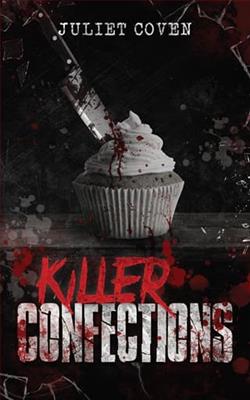Page 17 of Last Seen
“Well, that’s not disturbing at all.”
“I dreamed of you, Halley. You were alone, and you were crying. I did everything I could to find you, but it was dark, so dark. I’ve never seen such darkness. Thick and alive, like the deepest reaches of space.”
A chill parades down her spine. She can imagine it too well, and it’s creepy.
“Heads up, Dad, you’re on some pretty heavy-duty drugs, so chances are your thoughts and dreams are going to be messed up for a while.”
He nods and looks at her searchingly. His voice is soft, and he seems more with it. “I’m sorry I didn’t tell you about your mother. You shouldn’t have found out like this. Though what were you doing in my dresser?”
“Looking for the insurance card. Hate to say it, and this is not an ‘I told you so,’ but your infallible vertical filing system failed. There’s nothing from the insurance company.”
“You were looking at home. Of course there isn’t. In my office, at school.”
“Oh.” She sits back. Why she hadn’t thought of searching his work desk, who knows. “You neglected to tell me which desk, I think. I assumed home.”
“Sorry.”
“I’m sorry, too. I promise I wasn’t snooping. I’d just looked everywhere else and thought maybe you’d left it in your pants pocket. The envelope was in the Galileo book, I was flipping pages and it fell out. I looked ... Well, that part, I was snooping. But Dad ... Why didn’t you tell me? I can’t believe you’ve been hiding this from me.”
There is a long pause. “I didn’t want you scared, looking over your shoulder your whole life.”
“Scared of what?”
“Your sister. The situation. The whole thing.”
“The whole thing. Can you back up a little, though? I’m trying very hard not to lose it over here, and you’re not helping.”
“Raise my head, will you?”
She presses the button on the hospital bed, and he grimaces as everything shifts. She lets him gather his thoughts and push down the pain. She presses a pillow deeper under his neck and gives him a drink.
“Thank you. Cat ... Hell, where do I even start?”
Halley takes a seat in the brown pleather chair by his bed. It squeaks at her presence.
“How about at the beginning? Since the ending is so confused for me now, maybe there’s more you haven’t shared. You met Mom, you got married, she already had a kid ...”
“All right. The beginning. Yes. Susannah had a daughter named Catriona from her first marriage, yes. Obviously. Which was wonderful for me. I’d always wanted a big family, and Catriona was a shortcut. A head start. And Susannah and I were happy. At least, I thought we were happy. Marriage isn’t always as obvious as it seems.”
“No kidding.”
“Catriona was a handful, but she was only nine when we married. Plenty of time to grow out of it. Then you came along, and she pulled away. She was distant with us, distant with your mom. Susannah loved her so much. She made excuses. She protected her. But ... How do I say this? Catriona had a mean streak. She would put the cat in your crib, then yank on its tail so it would scratch you. She’d pull your hair.Pushed you around. She was physical with you, really rough. Gave you a black eye once. Said you two were boxing.
“She was very jealous and, turns out, at a really difficult age for a bad divorce and remarriage. Her behavior was getting more and more aggressive, so we took her to doctors. They said she was having issues adjusting because of an impulse disorder and put her on a stimulant medication. And it helped. Tremendously. Until it didn’t. They call it borderline personality disorder now, and they’re more careful with the medications. She was diagnosed in 1986, right before the comet.”
Halley’s Comet was the through line of Halley’s young life. It is her first memory, the four of them at the planetarium, her dad shivering in excitement. She was three, and she can remember almost all of that night—the darkened sky, the tail of the comet, her sister holding her hand and saying in awe, “You were named after that. Cool.” Her mother, laughing and kissing her dad as if he was the one to discover it through his telescope in the living room. As if he named it himself.
Three years later, her mother and sister were dead, and her memories become flaky.
“A year before she ... it happened, things went bad again. It was like a light switch. She wouldn’t take the medicine willingly, said it made her feel weird. She was depressed, then she was manic, then mean, then crying. They tried all kinds of different treatments. She finally admitted she was hearing voices. It was getting worse and worse, and we were afraid for you, and for ourselves. At that point, she was beyond our abilities as parents. We thought you were in danger.”
He blows out a breath, and Halley feels for him. He is struggling for control. She should tell him they can talk later, but she has to know. This is too big to wait any longer.
“I’m not proud of this, Halley. But the doctors recommended a place in the Blue Ridge, and we agreed. It was a summer program that, in addition to intensive psychological work and medications, takes kids out into the wilderness, teaches them self-reliance, teamwork, all of it. She came back worse than ever. We didn’t have a choice then. I didn’tthink camping with other troubled kids was going to help, but your mom ... She had such a soft spot for Catriona. Even they couldn’t handle her. So we arranged for a facility, inpatient treatment, for an extended period. She needed long-term psychiatric care.
“Catriona found out what we were planning. She had a huge fight with your mom. She went after you, tried to take you from the house. And your mom stopped her. Sometime during that fight, Catriona stabbed her. Then it was all over.”
Halley thinks there’s probably about nine million other facets of this story he’s leaving out.















